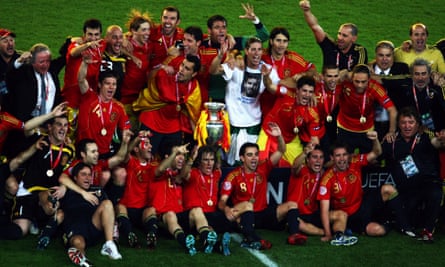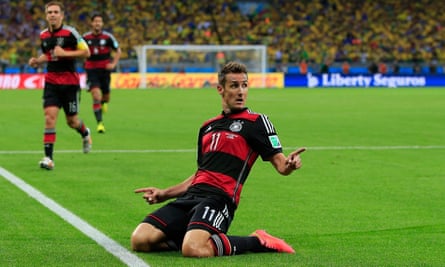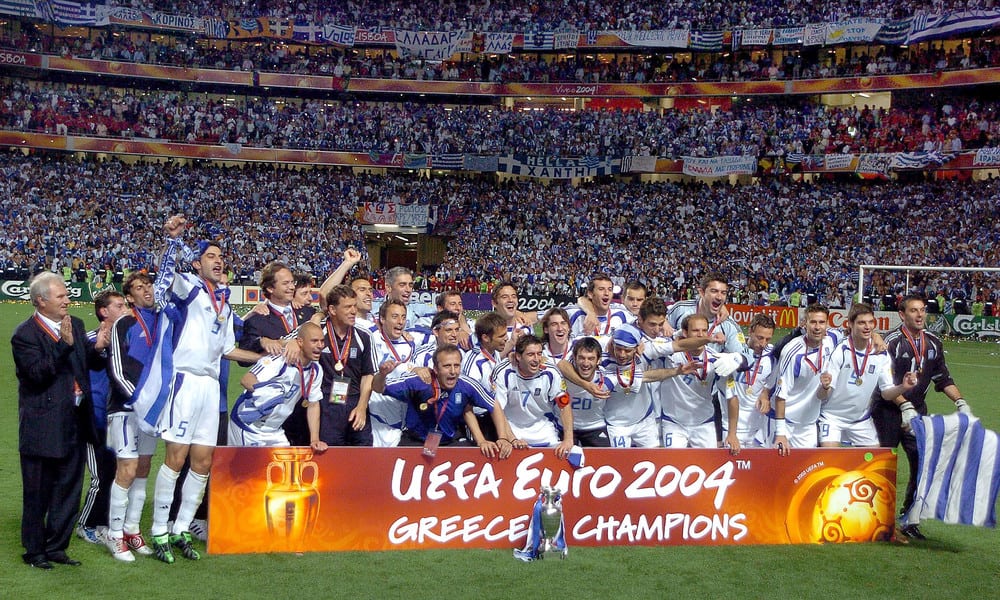s England prepare to face Switzerland in the quarter-finals of Euro 2024 on Saturday, Gareth Southgate finds himself being inundated with advice from all quarters. But should he really throw caution to the wind and rip up his teamsheet while also playing a left-footer at left-back? We look back at the 10 major international tournaments in the past 20 years for a possible template for glory.
Euro 2004: Greece
Otto Rehhagel’s Greece clinched the trophy courtesy of a 1-0 victory against their Portuguese hosts. “King Otto’s” deeply unfancied side had beaten Portugal 2-1 in Group A’s tournament opener. They proceeded to draw with Spain and lose to Russia, finishing second in the group before really hitting their stride and recording a trio of 1-0 knockout wins against France, the Czech Republic and, ultimately, Portugal. Otto Rehhagel claimed to have little interest in tactics but confused opponents by deploying a man-marking system while playing 4-5-1 against lone strikers and 5-4-1 when confronted with front twos. With sometime-sweeper Traianos Dellas shining in central defence and Angelos Charisteas, scorer of the winner in the final, a specialist at heading goals from crosses and corners, Rehhagel reminded everyone that, sometimes, sitting deep before undoing opponents with ultra-direct counterattacks really works. Fortune does not always favour the brave.
World Cup 2006: Italy
During a month in Germany, Italy conceded once from open play and that was an own goal in a draw against the United States during a group stage also featuring wins against Ghana and the Czech Republic. After topping Group E, Australia were dispatched 1-0 and Ukraine 3-0 before a 2-0 semi-final victory over the hosts. In the final against France the Azzurri fall behind to a controversial Zinedine Zidane penalty before Marco Materrazi’s equaliser prefaced an impasse ended by Italy’s 5-3 triumph on penalties. That final is remembered for Zidane’s extra-time red card for butting Materrazi in the chest but Fabio Cannavaro’s outstanding defending and Gianluigi Buffon’s brilliant goalkeeping proved the bedrocks of a campaign featuring Marcello Lippi’s innovative interpretation of 4-4-2. By accommodating two playmakers, Andrea Pirlo and Francesco Totti, stationed at the base and apex of midfield respectively, the formation bewitched fans and bewildered opponents in equal measure.
Euro 2008: Spain
Tiki-taka was born on the international stage in Austria and Switzerland as Luis Aragones proved you do not have to be young to be modern. As his 70th birthday beckoned, Spain’s previously pragmatic coach adjusted his tactics to the team’s personnel. Possession, short, slick passing and plenty of inter-match positional rotation became the order of the day, protected by Marcos Senna’s midfield anchoring ability. Xavi, Andrés Iniesta and David Silva ran rings around rivals and provided David Villa and Fernando Torres with the through-balls they craved. After topping Group D thanks to wins against Russia, Sweden and Greece, Spain survived a tough quarter-final against Italy, prevailing 4-2 on penalties after 120 goal-free minutes. All that remained was a 3-0 semi-final canter against Russia and a 1-0 final win against Germany with Torres scoring the winner to usher in a new era of Spanish dominance.

World Cup 2010: Spain
Now coached by Vicente Del Bosque Spain recovered from a 1-0 opening defeat to Switzerland to top Group H after restorative wins against Honduras and Chile. Despite much aesthetically pleasing kaleidoscopic passing and drifting between the lines, it proved surprisingly efficient, keeping five clean sheets and scoring eight goals in seven games. The knockout rounds involved Spain registering successive 1-0 victories against Portugal, Paraguay, Germany and the Netherlands. The bruising, yellow card-strewn final against a combative Dutch team was dubbed a “battle for football’s soul” and after the Netherlands’ reduction to 10 men was won by Iniesta’s goal, deep in extra time. Del Bosque dubbed Spain’s first World Cup triumph “a reward for beautiful football” but subsequently acknowledged: “We had a lot of luck along the way, I believe we were pre-destined to win.”
Euro 2012: Spain
Spain’s third successive major tournament win involved Del Bosque’s exquisite creation continuing to blindside opponents by defying longstanding conventions and orthodoxies. A 4-0 final victory against Italy in the final showcased a starting XI lacking a specialist forward. Instead, a front three of Silva, Iniesta and Cesc Fàbregas shattered the Azzurri’s midfield diamond, yet a showpiece staged across Poland and Ukraine did not prove entirely plain sailing. Admittedly, they topped Group C after drawing with Italy and beating Republic of Ireland and Croatia, and an often-breathtaking change of pace dispatched France 2-0 in the quarter-finals. But a bad-tempered and less than fluent semi-final against Portugal ended 0-0 after extra time, leading to a penalty shootout Spain won 4-2. The final reflected the winners’ imperious talents, with Del Bosque’s 4-6-0 formation not merely proving one of the most courageous tactical ploys but presenting Italy with an almost impossible challenge. Elevated to new heights, tiki-taka had reached a zenith.
World Cup 2014: Germany
Two things gradually became clear in Brazil: Germany’s head coach, Joachim Löw, had a strong bench and he knew how to use it. The prime example arrived in the final. With the game against Argentina goalless, Löw introduced Mario Götze in the 88th minute and challenged him to upstage Lionel Messi. Götze’s 113th-minute strike not only secured the trophy but emphasised this was a triumph of teamwork. Back in an era when Germany’s trains still ran like clockwork, the national team presented similar efficiency. With Toni Kroos frequently dictating an elegant midfield, they topped Group G thanks to wins against Portugal and the US either side of a draw with Ghana. An unexpectedly tight 2-1 last-16 win against Algeria after extra time preceded a 1-0 quarter-final undoing of France and then, the pièce de résistance; a 7-1 semi-final thrashing of Brazil. Despite being primarily right-footed and more usually deployed in central defence or at right-back, Benedikt Höwedes proved a mainstay at left-back.

Euro 2016: Portugal
Despite only being in the lead for 11% in France, and having Cristiano Ronaldo depart the field on a stretcher in the final against the hosts, Portugal somehow ended up lifting the trophy. It seemed emblematic that Éder, scorer of the decisive goal as they prevailed 1-0 in extra time in the final, had recently been described by the South Wales Echo as “one of the most disappointing signings” in Swansea’s history. Few imagined Portugal winning after they finished third in Group F after draws with Iceland, Austria and Hungary. Nonetheless, as one of the best third-place finishers, they proved defence really can be the best form of attack in beating Croatia 1-0 after extra time in the last 16, Poland on penalties in the quarter-final and Wales 2-0 in the semi-finals.
World Cup 2018: France
Streetwise France emphasised they could win ugly and turn on the style as Kylian Mbappé announced himself on the international stage, dissecting defences with his skill-suffused pace Didier Deschamps also showed his managerial counterparts precisely how to unlock Paul Pogba’s mercurial midfield talent. Les Bleus limbered up by topping Group C, beating Australia and Peru before drawing with Denmark. Argentina were beaten 4-3 as an awkward knockout route led Uruguay to be beaten 2-0 and Belgium 1-0 before a Luka Modric-inspired Croatia were sunk 4-2 in the final. There were a few nervous moments along the way but it was difficult to argueFrance, often brilliant in transition, were anything less than worthy winners.
Euro 2020: Italy
The value of practising penalties was highlighted as Italy won a tournament postponed until 2021 because of Covid. This was a highly unusual Euros with teams traversing the continent, shuttling between 11 host cities, culminating in a Wembley final. The Azzurri held their nerves to win a shootout 3-2 against England but also undo Spain on penalties in the semi-finals having beaten Belgium 2-1 in the quarter-finals. Having topped Group A with wins against Turkey, Switzerland and Wales, they made life hard for themselves during a 2-1 extra-time last-16 win against Austria. Overall, though, Roberto Mancini’sattractive, intelligent side were arguably the tournament’s best.

World Cup 2022: Argentina
After Argentina were shocked by Saudi Arabia in their opening game of the tournament, they and their supporters must have wondered if the world had stopped turning on its axis. Yet without always being entirely convincing, the team recovered to top the group thanks to restorative wins against Mexico and Poland in the first World Cup to be held in winter. Australia were eliminated 2-1 before a narrow and thrilling quarter-final victory over Netherlands and a 3-0 semi-final canter against Croatia. The final against proved breathtaking, featuring a Mbappé hat-trick and two goals from Lionel Messi before the latter fulfilled his destiny as Argentina won 4-2 on penalties. A streetwise side had confounded the doubters, but only after soul-baring squad talks after the Saudi debacle allied to Lionel Scaloni’s ruthless willingness to rotate players and change tactics.








More Stories
Amorim insists Fernandes not leaving Manchester United amid Madrid reports
How debt burden pushed Nigerian boxer Segun Olanrewaju to a fight that took his life
Nigeria Taekwondo Federation boss, Abdullahi Saidu dies at 53